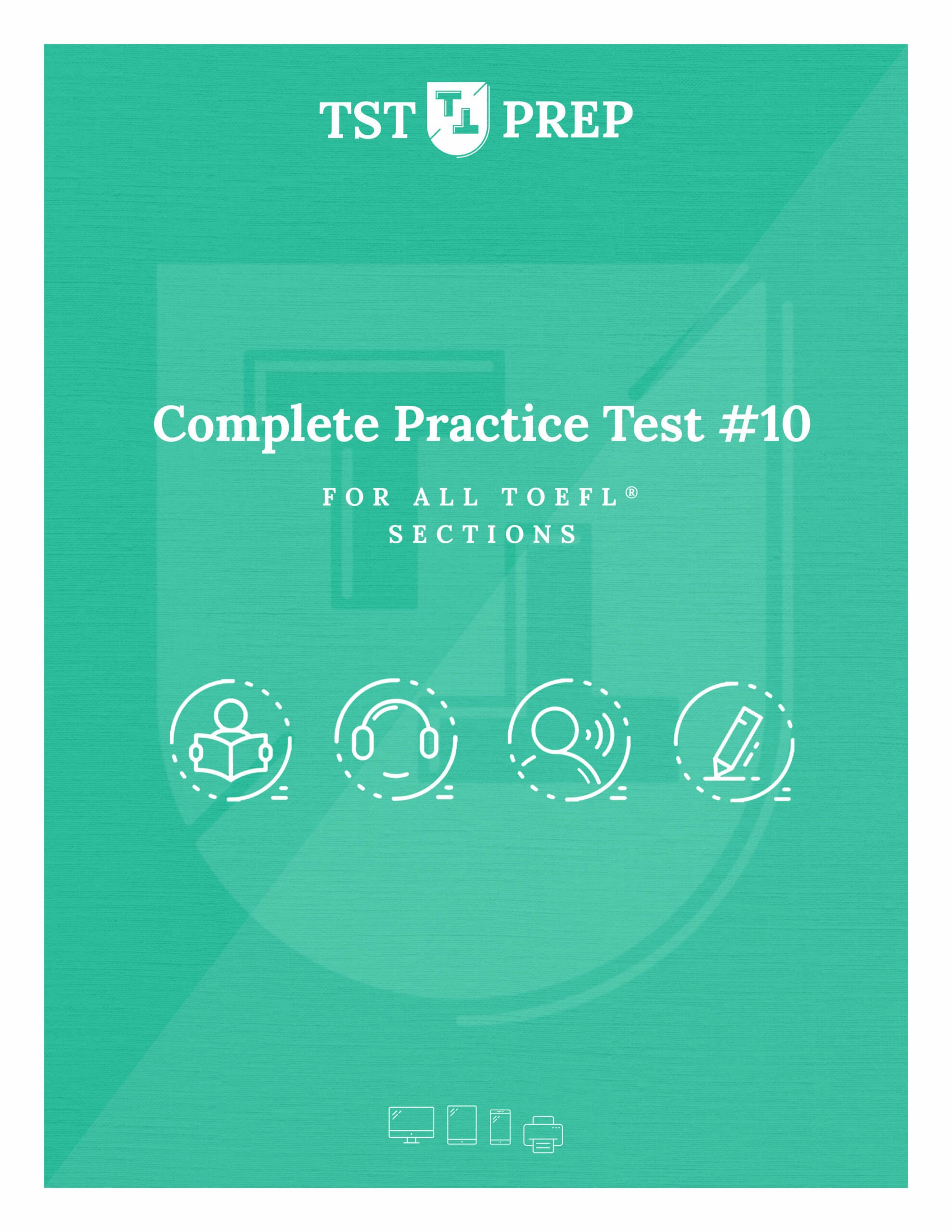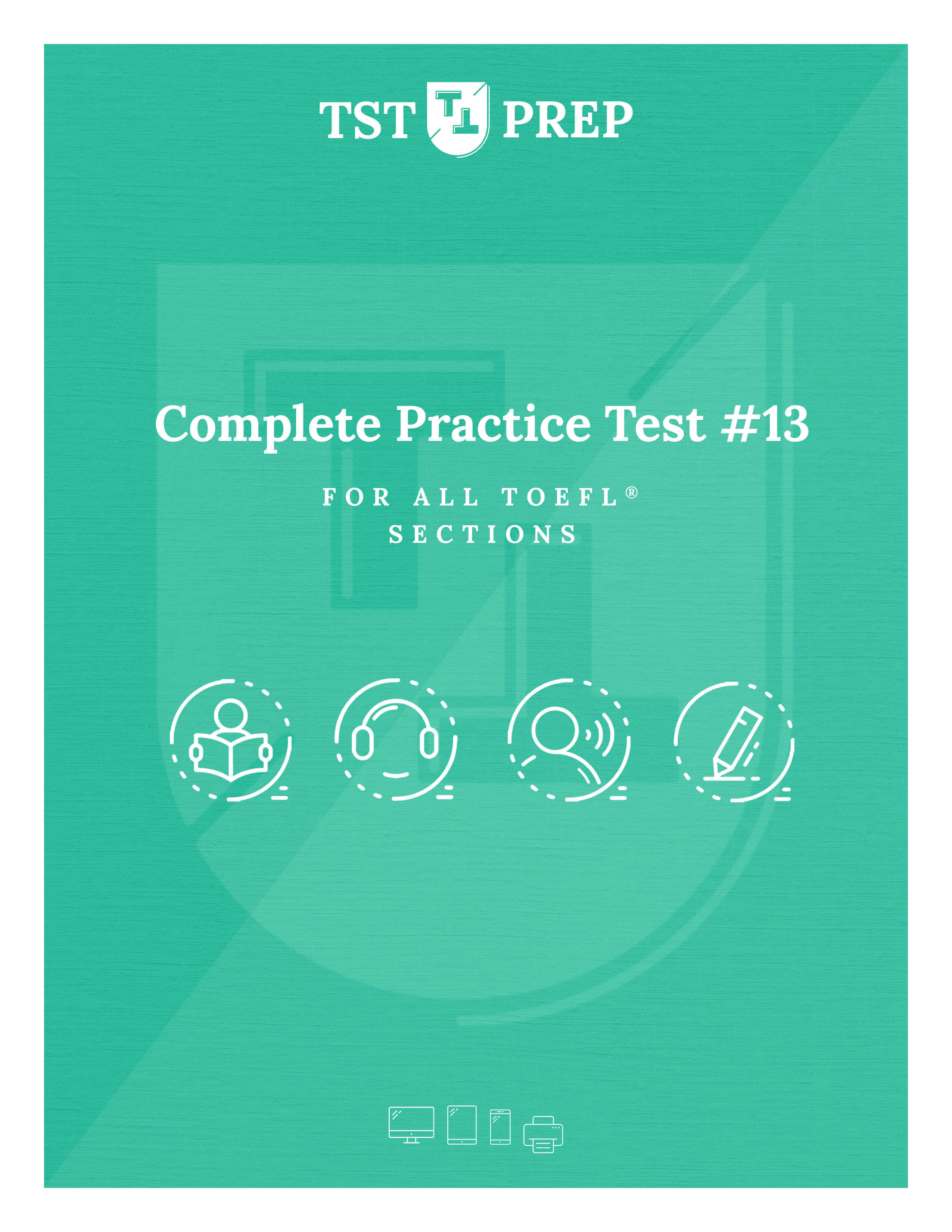Complete Practice Test for the TOEFL® Test

Free Practice Test for the TOEFL (PDF)
Ready to download the PDF version of your complete TOEFL sample test?
Well here it is: Complete Practice Test #10 so you can know what to expect on test day.
Or are you looking for Practice Questions for the TOEFL Reading ? Well, we have 100 of those for free right here. 100 Practice Questions for the TOEFL Reading Section
But wait!
Getting a complete TOEFL practice test is only half the battle.
You also need to learn the structure of the test and how to study effectively.
By the end of this short article, you will be able to distinguish the difference between the Reading, Listening, Speaking and Writing sections of the TOEFL. You will also discover five TOEFL study tips to help organize your study schedule and improve your TOEFL score.
Here is the TOEFL Exam structure and some helpful tips:
The TOEFL Exam Structure
The TOEFL Reading Section
The first part of the exam is the TOEFL Reading section. As of the latest TOEFL update on July 26, 2023, there are two academic passages of approximately 700 words each. The subjects will consist of texts found in a typical university textbook. Following each passage are ten questions about the reading passage. You will have 36 minutes to read the two passages and answer the 20 questions in total.
There are ten types of questions in the Reading section of the TOEFL. The frequency of each question type varies. Here is a helpful chart of the question types with examples of the question phrasing.
The Reading Section Question Types |
||||
|---|---|---|---|---|
| Question Type | Frequency | Time to Answer | Question Value | Question Phrasing |
| 1. Vocabulary | 2-4 | 60 seconds | 1 | “The word _________ in paragraph 2 is closest in meaning to…" |
| 2. Factual Information (Detail) | 3-6 | 90 seconds | 1 | “According to paragraph 4, what….” “Which of the following…” “It is stated in paragraph 4 that…” |
| 3. Negative Factual Information (Negative Detail) | 2-4 | 120 seconds | 1 | “All of the following are mentioned in paragraph 3 EXCEPT…” “Which of the following is NOT mentioned....” |
| 4. Inference | 2-4 | 90 seconds | 1 | “What can be inferred from paragraph 5 about…” “Paragraph 5 implies that…” “Paragraph 5 suggests…” |
| 5. Rhetorical Purpose (Author’s Purpose) | 2-4 | 90 seconds | 1 | “In paragraph 6, the author discusses ________ in order to…” “Why does the author mention…” |
| 6. Sentence Simplification (Paraphrasing) | 2-3 | 120 seconds | 1 | “Which of the sentences below best expresses the essential information in the highlighted sentence in paragraph 4?” |
| 7. Insert Text (Sentence Insertion) | 2-3 | 120 seconds | 1 | “In paragraph 2 there is a missing sentence. Where would the sentence best fit?” |
| 8. Reference (Pronoun Referent) | 0-1 | 60 seconds | 1 | “The word _________ in paragraph 1 refers to…” |
| 9. Prose Summary (Summary) | 1-2 | 150 seconds | 1 | “An introductory sentence for a brief summary of the passage is provided below. Complete the summary by selecting the THREE answer choices that express the most important ideas in the passage." |
| 10. Fill In A Table (Organization) | 0-1 | 150 seconds | 2-3 | “Complete the table below to summarize information about _________ in the passage. Match the appropriate statements to _________” |
For more information about the TOEFL Reading section, check out this post by Professional ESL Test Prep
The TOEFL Listening Section
After the Reading section, you will have to complete the Listening section, which will take about 36 minutes. The Listening section is divided into two identical parts. In each part, you will have three listening passages: one conversation between a student and campus employee and two academic lectures. The conversations last 2-4 minutes, and the academic lectures are approximately five minutes each.
You will be asked five questions after the conversation, ten in total, and six questions after each of the four academic lectures, 24 in total. The question types, like in the Reading section, vary. This chart explains the question types, with examples of phrasing, and the frequency of the question type:
The Listening Section Question Types |
|||
|---|---|---|---|
| Question Type | Frequency (per section) | Question Value | Question Phrasing |
| 1. gist - content | 3-5 | 1 | "What is the topic of the discussion?""What is the professor mainly discussing?" |
| 2. gist - purpose | 1-2 | 1 | "Why does the student visit the professor?""Why does the professor mention...?" |
| 3. detail | 6-10 | 1 | "What is stated in the passage about...""According to the speaker..." |
| 4. understanding the speaker's attitude | 1-4 | 1 | "What is the professor's oppinion of...?""What can be inferred about the student?" |
| 5. understanding the function | 3-6 | 1 | "What doest the speaker mean when he says...""Why does the professor say this..." |
| 6. making inferences | 1-4 | 1 | "What can be inferred about...?""What does the speaker imply about..?" |
| 7. understanding organization | 2-5 | 1 | "How does the professor organize the information about..." |
| 8. connecting content | 1-4 | 2 | This is a question where you must fill out a table and indicate the correct information."What does the professor imply about X?" |
Curious what these conversations and lectures sound like?
Exam English provides some audio samples here.
There used to be a 10-minute break during the TOEFL test but not anymore. As of July 26, 2023, the TOEFL test was shortened to take just two hours to complete, and the break time was retired.
The TOEFL Speaking Section
After the listening comes the TOEFL Speaking section. The structure of this section is different from the reading and listening. In the speaking section, you will encounter four questions. The first is an independent question, and the next three are integrated questions. Let’s take a closer look at each since they all follow a different structure.
The first question is usually a paired-choice question, which means you must decide between two choices. For example:
“Do you agree or disagree: all high school students should wear school uniforms.”
The questions range in subject matter, so there is no way to prepare a specific answer before the exam. You might be asked a question about business, travel, education, family, friendship, and so on. After the question is asked, you will be given 15 seconds to prepare a response and 45 seconds to speak.
Question two is the first of three integrated speaking questions. This is probably the easiest of all the integrated speaking questions.
First, you will read a short announcement about a new rule or policy on campus. Like question two, question three will begin with a short reading passage.
In task four, you are expected to listen to an academic topic for two to three minutes and then report on the information you heard. You will be given 20 seconds to prepare and 60 seconds to speak. In your response, you must be able to identify the topic of the lecture and the most important details.
The Speaking Section Question Types |
|||
|---|---|---|---|
| Question Type | Question Details | Question Explanation | Time Breakdown |
| Independent Speaking | Question 1Paired Choice | Asks about your general opinion on a wide range of possible issues. You usually have just two options. | 15 seconds to prepare 45 seconds to speak |
| Integrated Speaking | Question 2 Campus Announcement and Conversation | Report on the opinion of one of the speakers in the conversation and explain why he or she feels that way | 50 seconds to read/take notes 60-120 seconds to listen/take notes 30 seconds to prepare60 seconds to speak |
| Question 3 Academic Reading and Lecture | Explain the academic topic introduced in the reading and describe the main points about the topic described in the lecture. | 45 seconds to read/take notes 60-120 seconds to listen/take notes 30 seconds to prepare60 seconds to speak | |
| Question 4 Academic Lecture | Sum up the topic and main points from the lecture. | 120-180 seconds to listen/take notes 20 seconds to prepare60 seconds to speak | |
Here you can find some TOEFL Speaking topics for the independent speaking task with sample answers.
The TOEFL Writing Section
Finally, you have arrived at the last section, the TOEFL Writing section. The Writing section lasts about 30 minutes. Here, you will be expected to write an essay in response to two separate writing tasks.
The first is an integrated writing task, and the second is called Writing for an Academic Discussion. The integrated writing is almost identical to question #4 in the TOEFL Speaking section. You will read a passage, listen to a lecture, and then write about the two.
The last question on the exam was introduced on July 26, 2023, Writing for an Academic Discussion. You will be asked to contribute to an online discussion where a professor will pose a question, and two students offer their opinions. You will be expected to write at least 100 words that contribute to the discussion. Check out an example below:

Here is a breakdown of the tasks and the time allocations for the TOEFL Writing section:
The Writing Section Question Types |
|||
|---|---|---|---|
| Question Type | Question Details | Question Explanation | Time Breakdown |
| Integrated Essay | 1. Read an academic text2. Listen to a lecture 3. Write your essay | Connect the topic of the reading with the academic lecture. Show how the main points in the reading are contrasted by the lecturer. Only report on the information you heard and read | 3 minutes to read/take notes 2-3 minutes to listen/take notes 20 minutes to write |
| Writing for an Academic Discussion | 1. Read a topic introduction and question by professor 2. Read two student responses to the question3. Write your response | Write a response that adds to the discussion. Be sure to answer the question. You may cite some of the points made by other students, but it is not necessary. Aim to write at least 120 words. | 10 minutes to read and write |
Looking for more information on the Writing section?
Check out this link from the ETS website.
Woo hoo! The TOEFL is so exciting, right?
Excited enough to download the PDF version of a free and complete TOEFL practice test? Download our free Practice Test
Now that you are familiar with the structure of the TOEFL, it’s time to check out some exclusive TST Prep TOEFL Tips.
Five Tips to
Improve your TOEFL Score!
Here are five actions you must take while studying for the TOEFL so you can improve your score.
TIP 1: Get Used to the Clock
This is a timed iBT test! And, each section of the TOEFL lasts somewhere between 30 minutes to an hour. Therefore, it is very important to get used to working with the clock.
When studying at home, ALWAYS do practice tests under the test time constraints. This will prepare you to work under pressure and manage your time on test day. See the time breakdowns above for each section of the exam.
If you are struggling, practice without a timer first. Start to incorporate the timer with your TOEFL studies once you feel more comfortable working under the clock.
TIP 2: Type Without Spellcheck


On the TOEFL exam, you will not have access to spellcheck. Therefore, you should be practicing with spellcheck turned off! You are going to be responsible for finding your own grammar, spelling, and punctuation mistakes on test day, so start practicing this now!
This is especially true for the Writing section, where you will be writing essays. Give yourself extra time to edit and proofread your answers since you won’t have spellcheck there to do it for you.
Want more tips for how to tackle the Writing section?
Check out our Ten Awesome Tips for the Writing Section of the TOEFL® Test
TIP 3: Take Notes Like a TOEFL pro
Throughout the test, one of the most important things to do is to take notes! You will need to give yourself a little extra time to gather your thoughts and plan your answers. So, during the exam, you need to take good notes. Therefore, you should practice taking notes on your practice tests too.
I can’t emphasize this enough.
Note taking is important for EVERY section of the exam!
Want to know more about taking notes in the Reading section?
Check out Guide to TOEFL Reading Time Management
TIP 4: Study like an American!


As you prepare for the TOEFL, you should do a lot of TOEFL practice tests. Grading the TOEFL Reading and Listening sections of the exam is easy, but the speaking and writing sections will require professional help from a teacher or TOEFL expert.
Don’t make the same mistake as others. You need someone who knows about the TOEFL to listen to your speaking and read your writing responses. They will tell you your strengths, weaknesses and exactly what you need to do to improve.
If you just download the free TOEFL practice PDF without asking someone to grade your speaking and writing, then you are NOT putting yourself in a position to improve.
That’s why there are certified English teachers out there who are available to give you feedback on your practice exams, especially for the Speaking and Writing sections. Reach out to them to get the help you need while preparing for the TOEFL.
TIP 5: Prepare for a noisy TOEFL Test


Be prepared for a noisy room on test day. At the test center, you will hear the voices of other students because everyone will be responding to the speaking section questions at different times.
There will also be noise from people dropping their pencils, coughing, opening, and closing doors, etc. Trust us, it is not going to be ideal for test-taking.
So, in order to simulate this kind of test environment, take your complete TOEFL iBT practice tests in a coffee shop or in another, louder area. That way, you will already know how to ignore these kinds of distractions on test day!
Look, we know the TOEFL exam is a huge undertaking, and kudos to you for taking it on! If you feel like you want more help, Sojourning Scholar also made a list of the Best TOEFL YouTube Channels in 2023 where you can find additional helpful materials.
The fastest and easiest way to your TOEFL score is through practice. Use this free test to get started:
Complete Test #10
Did you find these TOEFL tips helpful? Is there another TOEFL tip you believe is useful?
Let us know in the comments section below.
And we are always here to help if you have any questions: [email protected]








Hey Josh, I’m gonna start off by saying thank you so much to you and the rest of the TST folks for everything that you guys do. I learned a ton from the emergency course which only took me 2 weeks to finish, compared to a month I spent studying on my own. Clearly DIY doesn’t apply to everything in life. Haha! But seriously, the course definitely helped boost my confidence. My exam is in 2 days and I’m not panicking which is a really good sign. I’ll give an update after the exam. Stay safe guys 🙂
Hi Azriel, happy to hear it helped. Good luck on the test and make sure to let me know how it went.
Hey Josh! The exam went really well. I only needed to score 92 and I got 109! Pretty stoked that I got 25 on the speaking section too. The templates definitely helped… Thanks again.. cheers!
I kinda feel nervous right now, but please any suggestions on area of concerntration , cause literally have been reading from a different perspective on those tips guide written , what text book do you suggest me to to read , cause right now am confused
Hi Victory and thank you for your question. Of course, my first suggestion is to check out the TOEFL Emergency Course. I will leave a link below. It was designed to give you just the most essential information you need to know about the TOEFL. In terms of books, I usually recommend ETS’ official guide since it is relatively cheap and the tests are reliable. I hope that answers your question.
https://tstprep.com/toefl-store/toefl-emergency-course/
Hello there! I’ve been studying for the TOEFL for quite some time now, and I feel that I might do better than before this time because I took the time to study. However, even though I learned how this test is structured, I cannot stop feeling incredibly anxious. Is there a way to calm down and relax before taking this test. I feel like I will fail it due to my crippling nervousness. I know that some professors had suggested to view the test (speaking section, I am looking at you) as a story rather than a test, but I can’t seem to do this. Do you think that I might need more practice? Any tips or suggestions? Thank you in advance!
Hi Belymar and thank you for your question. It sounds like you have practiced enough. You are nervous because you have been imagining the test in your head for quite some time and now it is a reality. If it makes you feel any better, you are not alone. Most students get nervous. You may find this video useful – https://youtu.be/D400ReYYmg4
I hope it helps!
Hi Josh, I took the TOEFL on August 23 and I decided that on August 21 so i had just one day and a half to study. I studied hard with no sleep, I just watched your videos on youtube, I read your website, I did some test for speaking and I learnt some templates of writing and that’s all!
Now I scored 107/120, mostly thank to your suggestions!!! (30 Reading, 26 Listening, 23 Speaking, 28 Writing).
I would suggest you, if I may, to put more and more things and tips about the speaking part, cause to me it was absolutely the most difficult part (if you’re an anxious kind of person it’s a nightmare!).
So thank you very much, you helped me a lot!!!
P.S. Everyone who wants to try TOEFL IBT AT HOME EDITION should know that, even if they say that the approximate time for score reporting is 6 to 10 days, usually that means that they will give it to you the last day, because with COVID 19 they have a lot of troubles.
Thank you for sharing your experience Raffaele and I’ll keep it in mind in the future. We do provide quite a few free materials for students like you do not need to prepare much for the test. Two days is impressive! For students who need more help and practice with speaking, I would definitely recommend TOEFL Speaking group classes since you can complete them in less than a month and you get a lot of feedback and practice from a teacher. – https://tstprep.com/toefl-store/toefl-speaking-group-classes/
I am pretty much in the same situation. I speak English quite well. I can perfectly communicate with native speakers. Also, I can understand like 95% of the English spoken in movies.However; tests make me really nervous and anxious. Especially, if I have to utter an answer to a weird question like those in the toefl ibt speaking section. 😫😣I’m taking the test on Sunday, September 13 ; and I haven’t studied much. But, I’ve been watching TSP videos on YouTube.
Hi Lili, I hope it went well, trust me you’re not alone. Many students feel the same way about the speaking! How did it go?
Hello, I am planning to give TOEFL after 2 years. I want to score more than 100 and my speaking and writing skills are not great. Will 2 years of practice and study be enough to score more than 100 in TOEFL ibt. Also, I don’t know that how proficient I am right now in English.
Hi Anshuman and thank you for your question. Everyone is different. However, I think two years is a realistic time-frame to acquire most languages at a proficient level. It depends on your study habits and a lot of factors but, in general, yes, I do think that is enough time.
I am planning to give TOFEL but I am not much aware about the exam pattern & how to start to study.I am not that much good in english so please guide me to start the study.
Hi Priti and thank you for asking. I suggest starting with our TOEFL quick guide. It is a short summary of the test structure.
You can download it for free at this link – https://drive.google.com/file/d/1qQ2rNwFx0P9y2wUp9gRmjKHFPuQBG23f/view?usp=sharing
I hope that helps.
Thank you so much for your lectures and tips Josh MacPherson. My question is; In the speaking session of the test (speaking type 2 and 3) which has both reading and listening, after listening to the lecture, will the reading be displayed back on the screen before speaking?
Good question. No, the reading will not be displayed on the screen while you speak. You will have to rely on your memory. Just remember in the TOEFL Writing section, for the Integrated Writing question (#1), the reading DOES return. I hope that helps.
Hi there, I am so glad about this webpage, you guys have really good material. I am an English teacher from Colombia and I’m looking forward to presenting the toefl exam, I will also prepare a student to present the exam. So, your tips, material and YouTube channel have been so helpful, thanks a lot.
Thank you for your kind words Luisa, I will do my best to continue to make high-quality materials.
Hi, I have my TOEFL exam on JULY 1st. (in 2 days)
I solved your practice test #13 today.
I got scores 28/30 in reading and 27/30 in listening. I believe speaking section was not that good for me. I could do well on writing section.
Can you please provide me with another practice test as early as possible?
Thanks a lot in advance
Hey Siddhant, please check your e-mail. Good luck!
What does “TOEFL” mean? From which words is it an abbreviation?
Good question.
Test of English as a Foreign Language
TEST OF ENGLISH AS A FOREIGN LANGUAGE
Hi there, is it necessary for someone to be well- versed in computer when you have to take the exam?
Hi there and good question, It depends on what you mean by “well-versed”. You certainly do not have to be a computer programmer. However, you must be able to type your essay responses and navigate through the test using mostly a mouse and a keyboard. So, no, I don’t think you need to be “well-versed”.
Thank you so much for all the information about Toefl exam I found them really helpful. I want to improve my writing skills and I follow the templates that you provide, but is there a specific template for each type of question in the independent writing part . Cause I noticed that there are agree/disagree question, opinion question and maybe other types.
Hi Gardenia and great question! The independent writing question template should work with almost all independent writing questions.
However, sometimes, the introduction paragraph might have to be changed a bit. The template for the bodies and the conclusion will almost always work. I hope that helps!
hello, i am really confused about my toefl preparation . 1st thing bothering me speaking and writing section of toefl. Can you please suggest me where and how can i improve my speaking and writing skills in two months .my toefl exam is on may . so please suggest me.
The best approach is to hire a teacher, especially for speaking and writing since it requires a great deal of feedback in order to improve your performance over time.
However, if you prefer to do it on your own, then I would recommend tools that automatically check your writing and speaking like Grammary Academic ( https://www.grammarly.com/premium ) or Speechace (https://www.speechace.com/), so you can get a lot of feedback.
I hope that helps!
TST Prep YouTube videos helped me secure 92 in my first attempt. I am planning to appear for another one in 14 days. Its been 8 months since I last studied for TOEFL. I am aiming for 120, more like 110. Please suggest an effective way for improving my marks.
Hi Mohit and thank you for watching our videos 🙂
Well, to improve your score by 18 points in 14 days is not realistic (in my opinion). However, the best way to improve is to speak and write a lot while getting feedback from an experienced TOEFL teacher, while also doing practice tests that you review, check your answers and learn from.
That’s it really, just practice, feedback, and support… but it does take time.
I found it interesting for beginners who are going to take the exam.
Thanks for the comment and we are happy to hear you found it helpful. Let us know if there are any other articles you’d like to see us post in the future.
Hey there!
I’m Jean Paul KABANGU getting ready for the TOEFL iBT test.
I’m glad to find you all here.
Hi ..I am taking the test on the 8th of feb 2020 and im very glad that i found you on YouTube while searching for materials that can be helpful for studying..
Thank you for your kind words Raghdah and happy to help. Let me know if you need help with anything.
hey, how can i find you on youtube?
Hi there Hala Qasim and thank you for your interest in our Youtube channel. You can find me here – https://www.youtube.com/toeflspeakingteacher1
If you subscribe it would be a BIG help 🙂
Hi…..I am preparing for my TOEFL exam on the 11th January 2020. Your lectures on the Youtube helps me very much. Today, as I listened to the 5 mistakes, in your youtube lessons, I realize the need to do more practices.
Hi Khaling and thank you for your support. I’m happy to hear you found the videos helpful. Good luck this weekend and let us know how it goes 🙂
Hi
How tough was the exam? Can you please share your experience with me?
Hello, I am really happy studying here and I am planning to take classes with this program the next year. I feel that my English is not good enough at this moment so I am taking advanced English classes at college first. But I have a question, how can I know if my English is good enough for taking the TOEFL test?
That’s a great question Maria. Well, you’re writing in this comment is excellent! Besides that, you could take our TOEFL Diagnostic test, which is a shortened version of the test so you can discover your current approximate level – https://tstprep.com/toefl-store/toefl-diagnostic-test/
Let me know if there’s any other way we can help!
I am feeling very anxious this morning. My test is this coming Saturday (28 September) and it feels like despite studying and reading a lot, I am not getting far! Is this normal? For instance the writing section, I have followed the tips on your website and your videos (keep it simple, don’t try to be smart) however if you read the high rated answers to the independent writing they sound very smart! This is confusing to me as I feel that a “simple” answer and sticking to facts might not be rated so high?
Hi Corlia and thank you for your question. For the speaking and writing sections, everyone performs at a different level and has their own strengths and weaknesses. It is hard for me to give specific advice to you in your situation without reading your writing. In general, when students try to “sound smart”, they tend to use vocabulary and grammar they don’t understand very well, and the graders can tell that the essay is awkward, hence my advice.
However, if you are comfortable writing in complex lexical and grammatical then try to sound smart! If you are still confused, I would suggest meeting a teacher or submitting an essay for evaluation here.
Hope that answers your question. https://tstprep.com/toefl-store/toefl-writing-evaluations/
I’m very glad to reading and understanding of TOEFL book my test fall on 8 of February 2020 i have no fear of it nor worry about exam thank to ubc for their carrying